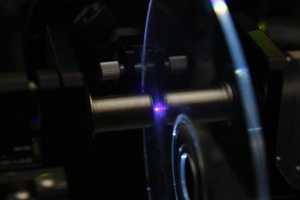
General Electric Research have recently unveiled that they have created Optical Discs with 500Gb’s of total storage capacity, the equivalent to approximately 100 DVDs!
The ‘micro-holographic discs’ are to be aimed more for industrial users (For backup and storage capabilities) but they haven’t disputed the fact that they could also be used by normal home users, as users who store masses amount of data (gamers for instance) will be able to take advantage of these awesome tools!
Micro-holographic discs can store more data than DVDs or Blu-ray discs because they store information on the disc in ‘three dimensions’, rather than just pits on the surface of the disc.
Just imagine backing up ALL of you’re data onto just one (or maybe three of four in my case!!) disc!
GE Research are currently working with a number of hardware manufacturers at the moment, in order to bring these tools to the consumer as quickly as they can. At the moment, cost hasn’t been made public, but I wouldn’t imagine them to be cheap, but then again, with this type of capacity I’m not sure users will mind spending that little bit extra!
Look out for these over the coming months!

![🎛 [FOUR INTERFACES] BoxWave Smart Gadget Compatible With Logitech Spotlight Presentation Remote. BoxWave's AllReader SD Card Reader is one of the most VERSATILE SD and microSD card readers for your device! Comes with four interfaces including USB-C, ...](https://m.media-amazon.com/images/I/319zLvouDUL._SL160_.jpg)

Gadgeteer Comment Policy - Please read before commenting
Interesting review. I have purchased two 1 GB SATA USB hard drives ($99 each) for the exact purpose. I have stopped using DVD’s and have moved all of the data contained on over 300 DVD’s to these hard drives. Since this type of hard drive is very reliable my experiment is to remove the need to keep buying more DVD’s for storeage of any type of data as well as the need for a optical drive on every computer I own.
I’m probably in the minority here, but I can honestly say that I’ve probably burned less than 25 CDs or DVDs in my lifetime. I just don’t do it. I back up all my data on to external hard drives.
I like the tech here..but like Robert and Julie kind of said, it may be technology that is a year or so late. With all these types of external hard drives available for consumer use, where would you find use for optical medial. Aside from maybe putting all your dvds into 1 or 2 discs.
I also do not use optical media for back up storage since I have some ext hard drives I use. Honestly the only time I use optical media is making music cds for my car. That way if I forget my ipod or I dont want to hear random streaming music from my bb, I have songs that I like already loaded in my car.
I am pretty sure that most companies use hard drive based systems, raids, to back up their system.
Nice post but the tech maybe a legacy before it is made for consumer consumption.
This technology, while totally awesome just won’t go anywhere. What would it be used for? Back ups? Tera-byte drives are cheap, everywhere and much more read-write friendly than an optical disc. Movies? Doubt it… media groups like cinema have only just started up with 1080HD filming. Picture studios are releasing entire trilogies in 1080 and 5.1 on a single Blu-Ray disc (The Fast and The Furious for example). Unless cinema starts getting recorded at a resolution well over 3000 horizontal lines, a disc of that capacity would be pointless. Recording at such resolution is completely pointless as the difference in picture quality on a 50″ Plasma would be negligible. Unless cinema and movies go fully 3D, renders at over 200fps and uses 11.2 audio, there would be no use for the discs there. And as for in the home? A scratch on a CD costs you a split second of audio, a scratch on a DVD can cost between 2 seconds of skipping and disc lock up, a BLU-Ray scratch is similar effect on a higher quality movie. Now imagine the data loss when a scratch penetrates and distorts a hologram of data. I’ve got 3 kids under 4, all our movies are in DivX on Hard Drives where they can’t destroy them after a guest didn’t put a disc back in its case and the 1yr old ground it into the floor!
Still a mechanical spinning thingy. Surely solid state is the way to go. Then again, if it is really really holographic, we can zap it with a laser and make a copy of all 500Gb in just a blink of an eye. The data rate for such a large capacity has to be of the same order of magnitude to make it meaningful. How long will your USB hard drive be grinding away to transfer all that stuff?